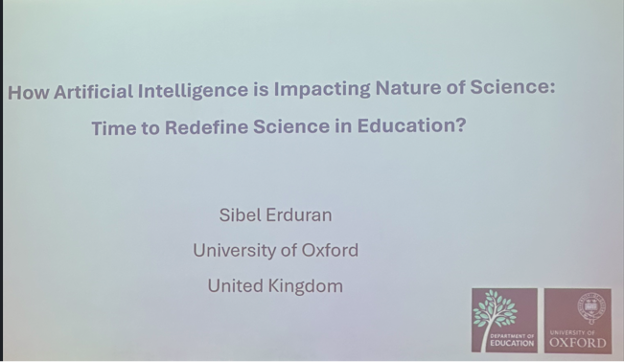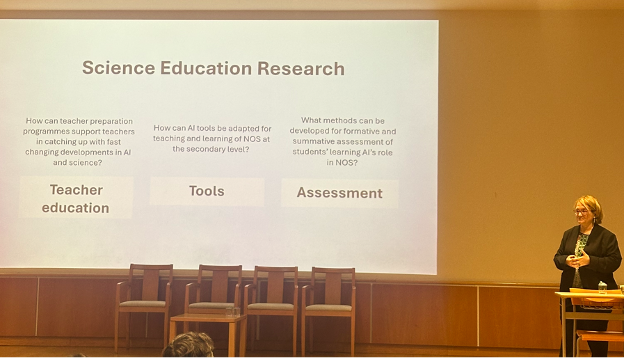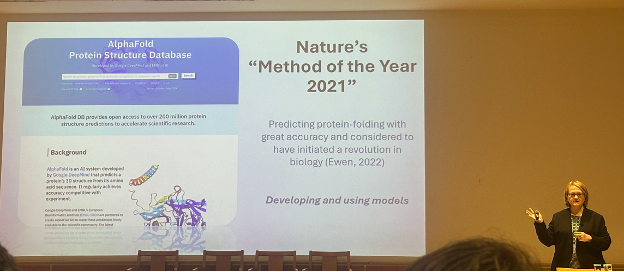“How Artificial Intelligence is Impacting the Nature of Science: Time to Redefine Science in Education?"
“How Artificial Intelligence is Impacting the Nature of Science: Time to Redefine Science in Education?"
Reflection by Ozlem Zengin

Presenter: Prof. Sibel Prof. Erduran , University of Oxford, UK
Prof. Sibel Prof. Erduran , a leading scholar in science education from the University of Oxford, delivered a highly engaging and timely presentation exploring the profound ways in which Artificial Intelligence (AI) is transforming not only scientific practices but also the foundational understanding of the Nature of Science (NOS). Her central argument emphasized that educational systems must adapt to these transformations by redefining science education, its aims, content, and methods to reflect the realities of 21st-century scientific inquiry.
Why the Nature of Science Still Matters and Even More So with AI
Prof. Prof. Erduran began by reaffirming the critical role of NOS in science education. The Nature of Science refers to the values, assumptions, and practices that underpin scientific knowledge and inquiry. She stressed that a nuanced understanding of NOS enables students not only to learn scientific facts but also to comprehend how science works and why it matters.
However, with the rise of AI, traditional notions of experimentation, observation, and human-driven hypothesis generation are being supplemented and, in some cases, replaced by data-driven, machine-led processes. This shift raises important educational questions: Are students being prepared to understand AI-driven science? Are current curricula and pedagogies equipped to address this change?
AI's Expanding Role in Scientific Practices
Prof. Prof. Erduran illustrated how AI technologies are becoming integral to modern scientific practice. She listed specific areas where AI is already revolutionizing research, including:
• Creating predictive models and simulations that can forecast scientific phenomena.
• Determining molecular properties through machine learning algorithms, without direct experimentation.
• Mining massive datasets to extract insights beyond human capacity.
• Organizing, filing, and searching scientific databases at unprecedented speeds.
• Synthesizing chemicals automatically, allowing for high-throughput experimentation.
• Analyzing visual data, such as images, for scientific documentation.
• Conducting literature reviews and comparisons using AI-assisted tools.
These changes mean that scientific discovery is no longer confined to human reasoning alone, but increasingly augmented by intelligent machines. This redefinition of how science operates must be reflected in how science is taught.
Implications for Science Education Research and Practice
The second half of the presentation focused on how science education research and practice must respond to these shifts. Prof. Erduran proposed a three-pronged research agenda:
a. Teacher Education
• Teachers need professional development to understand AI’s role in science.
• Curricula in teacher education programs must include critical engagement with AI tools and their scientific applications.
b. AI-Based Tools for Teaching and Learning NOS
• Development and classroom integration of AI tools that help students explore the Nature of Science in dynamic and interactive ways.
• Tools should go beyond content delivery to support epistemic understanding—how knowledge is constructed and validated in AI-integrated scientific fields.
c. Assessment of Students’ Understanding
• Innovative methods are needed to assess how well students grasp the evolving NOS in an AI context.
• Both formative (during learning) and summative (after learning) assessments must be reimagined to reflect AI's presence in science.
Interdisciplinary Collaboration Models
Prof. Prof. Erduran also explored interdisciplinary collaboration between AI and science education. She highlighted three approaches:
• Co-planned instruction: Educators from science and computer science collaboratively design lessons.
• Co-teaching models: Joint delivery of lessons by teachers from both disciplines.
• Parallel teaching with aligned objectives: Separate sessions in science and computing that emphasize complementary concepts (e.g., algorithms in computing and scientific modeling in science).
Such models not only foster a more integrated understanding among students but also promote teacher collaboration and cross-disciplinary dialogue, which are essential in preparing learners for a world shaped by AI.
Review of the Research Landscape
To support her claims, Prof. Prof. Erduran presented the findings of a bibliometric and content analysis of 76 studies indexed in Web of Science and Scopus between 2013 and 2023. The studies explored the application of AI in science education and revealed five prominent themes:
• Educational robotics
• Data mining and machine learning
• Intelligent tutoring systems
• Automation of teaching and assessment
• Application of AI to enhance science content delivery
This literature review revealed both promising developments and significant gaps—especially in how AI’s impact on NOS is being theorized and addressed in educational settings. She noted that while many tools exist, few are critically examined through the lens of NOS.
A Case Study in AI-Driven Scientific Breakthroughs
To ground the discussion in real-world innovation, Prof. Erduran presented the case of AlphaFold, a deep learning system developed by DeepMind, which was named Nature’s "Method of the Year" in 2021. AlphaFold achieved a major scientific milestone by accurately predicting protein structures—a task that had baffled scientists for decades.
She emphasized how AlphaFold represents a paradigm shift in biology, where AI is not just supporting science but becoming a core driver of discovery. Such examples underscore why students need to understand how AI participates in scientific processes, not merely as a tool, but as a methodological agent.
Conclusions: Redefining Science Education for the AI Era
In concluding her presentation, Prof. Prof. Erduran posed a crucial question to the audience:
"Is it time to redefine science education in light of AI’s transformative impact on the Nature of Science?"
Her answer was a resounding yes, supported by both conceptual and empirical evidence. She argued that:
• AI is reshaping the epistemology and methodology of scientific practice.
• Science education must evolve to include critical awareness of AI.
• Teachers, researchers, and curriculum designers must collaborate to develop responsive, forward-looking frameworks.
• AI should be positioned not only as a subject of study but as an active agent in teaching, learning, and assessment.
Final Thought
Prof. Prof. Erduran’s presentation challenged traditional assumptions and invited educators and researchers alike to reconsider what it means to "do science" in the classroom. Her vision points toward a future where science education is not only technologically enriched but epistemologically transformed, preparing students not just to use AI, but to understand its role in the very fabric of modern science.


